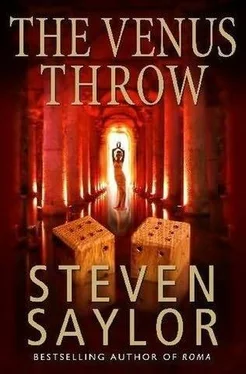Steven Saylor - The Venus Throw
Здесь есть возможность читать онлайн «Steven Saylor - The Venus Throw» весь текст электронной книги совершенно бесплатно (целиком полную версию без сокращений). В некоторых случаях можно слушать аудио, скачать через торрент в формате fb2 и присутствует краткое содержание. Жанр: Исторический детектив, на английском языке. Описание произведения, (предисловие) а так же отзывы посетителей доступны на портале библиотеки ЛибКат.
- Название:The Venus Throw
- Автор:
- Жанр:
- Год:неизвестен
- ISBN:нет данных
- Рейтинг книги:3 / 5. Голосов: 1
-
Избранное:Добавить в избранное
- Отзывы:
-
Ваша оценка:
- 60
- 1
- 2
- 3
- 4
- 5
The Venus Throw: краткое содержание, описание и аннотация
Предлагаем к чтению аннотацию, описание, краткое содержание или предисловие (зависит от того, что написал сам автор книги «The Venus Throw»). Если вы не нашли необходимую информацию о книге — напишите в комментариях, мы постараемся отыскать её.
The Venus Throw — читать онлайн бесплатно полную книгу (весь текст) целиком
Ниже представлен текст книги, разбитый по страницам. Система сохранения места последней прочитанной страницы, позволяет с удобством читать онлайн бесплатно книгу «The Venus Throw», без необходимости каждый раз заново искать на чём Вы остановились. Поставьте закладку, и сможете в любой момент перейти на страницу, на которой закончили чтение.
Интервал:
Закладка:
"You won't regret it," I said. "This comes from my private stock. I still have some jars of wine remaining from my brief tenure as a farmer up in Etruria a few years ago. It was a very good year-for the wine, anyway." I handed them each a cup. Before I could pick up my own, the woman quickly put hers down and reached for mine. "I changed my mind," she whispered hoarsely. "Less water will suit me. If you don't mind."
"Of course not." I picked up the cup she had abandoned and held it before my lips, pretending to savor the bouquet. She watched me intently and put her cup beneath her fleshy nose, sniffing at it cautiously with no pretense of enjoyment, waiting for me to take a sip before she would do the same. It was an absurd moment, like a scene in some hackneyed comedy, except that had we been on a stage the audience would have hooted at us for playing our parts too broadly.
At last I put the cup to my mouth and drank, letting the red wine linger on my lips for a moment before licking them clean, to show her I had swallowed. Only then did she sip cautiously from her cup. Her companion, having watched this interchange as if awaiting permission, put his cup to his lips and drained it. "Excellent!" he exclaimed, his voice slipping into a higher register. He cleared his throat. "Excellent," he said again in a voice that was deeper but still distinctly feminine.
For a moment we sipped our wine in silence, listening to the crackling of the brazier. "You seem cautious about stating your purpose," I finally said. "Perhaps you could begin by telling me your names."
The little man looked at the woman, who then turned away from the flames and hid her face in shadow. After a moment the little man looked back to me. "No names," he said softly. "Not yet."
I nodded. "As you wish. What do names matter, anyway? Names are but a cloak, a garment which men put on and take off. A disguise, if you will. Don't you agree?"
The little man looked at me with gleaming eyes-was he intrigued, or had he simply drained his cup too quickly? His companion kept her face in shadow, but again I felt the heat of her gaze. "A name is not the same as a thing," she finally whispered.
I nodded. "So I was taught long ago-when I lived in Alexandria, as a matter of fact. And yet, without names, we have no way of discoursing with one another about the things those names represent."
The woollen mantle nodded gravely up and down.
"A thing is called one name in Greek, another in Latin," I said. "The thing remains the same. That which applies to things must also apply to persons. King Ptolemy of Egypt, for example, is King Ptolemy, whether we give him the Greek title basileus or the Latin title rex."
The figure in the stola drew a sharp breath and seemed on the verge of speaking, but held back.
"So it is with the gods themselves," I went on. "Romans call the father of the gods Jupiter; Greeks call him Zeus. 'Jupiter' is an onomatopoeia for the sound of lightning striking the earth, while 'Zeus' captures the sound of a thunderbolt cutting through the air. Thus do names convey to the ear what the eye and the soul of man perceive, however imperfectly."
"Exactly!" whispered my visitor. The head tilted to reveal the eyes, which were fixed upon me with the excitement of a teacher who hears his pupil repeating back to him a lesson learned long ago but never forgotten.
"Still, names are not things," I said, "and while the study of names may fascinate us, it is the study of things, or more precisely our human perception of things, which must occupy anyone who cares to discover philosophy. For example: I see the flame in this brazier, yet how do I know that it exists?"
The little man, who had availed himself of more wine during my discourse, laughed out loud. "Simple — put your hand into the flame!"
I clucked my tongue disapprovingly. "You must be of the Epicurean School, if you believe that by sense perception alone we can determine the actuality of existence. Epicurus taught that all sensations are true; still, the fact that I am burned by the fire should be no proof to you of its existence, since you would feel no pain."
"Ah, but I would hear you scream."
"Perhaps; but there are those who can endure such pain without screaming. If I didn't scream, would the fire be any more or less real? What if I did scream, and you happened to be deaf and looking elsewhere-would I still have been burned? Then again, if I were to scream, and if you were to hear me, you still would have no way of knowing whether my pain was real or a sham."
"You seem to know a lot about such things," said the young man, who smiled and took another sip. I noticed he had spilled a bit of wine on his toga.
"A little. Philosophy is the creation of the Greeks, of course, but a Roman may attempt to comprehend it. My old patron Cicero made himself something of an expert on philosophy, to help his oratory. From the Skeptics he learned that a proposition is always easier to disprove than to prove-a useful thing for a lawyer to know, especially if he has no scruples about defending guilty men."
I took a long sip of wine. The mood in the room had changed completely. My visitors' frosty suspicion had melted into trust. The com-forting cadence of philosophic discourse was familiar ground, as I suspected it would be.
"But just as a name is not a thing, so appearance is not existence," I went on. "Consider: two visitors come to my home. At first glance, they appear to be a man and a woman, and this is clearly the impression they wish to give. But on closer scrutiny this is only an impression, not the truth; thus do my senses tell me and my powers of logic deduce. Questions follow: if the man is not a man, and the woman is not a woman, then what are they? Who are they? Why do they wish to be perceived as something they are not? Who are they trying to fool, and why? And why do they come to the house of Gordianus the Finder?"
"And do you know the answers to all these questions?" rasped my visitor in the stola.
"I think so, to most of them, anyway. Though some things about your companion still puzzle me…" I looked at the little man, who smiled in a way I couldn't account for, until I realized that he was smiling not at me but at someone behind me.
I turned to see my daughter, Diana, in the doorway.
Her posture was tentative, as if she had merely paused to have a look into the room and would move on at any moment. She wore the long-sleeved gown that children of both sexes wear, but at thirteen she was already beginning to fill the garment in ways unmistakably feminine. Her dark blue gown merged with the dimness of the hallway, so that her face, lit up by the brazier, seemed to hover in the air. Her skin, which had the creamy texture and the rosy glow that my visitor's painted cheeks so crudely mimicked, made the darkness of her long eyelashes and her thick eyebrows all the more pronounced. The flames caught the highlights of her long black hair, which was parted in the middle and fell down her shoulders. Her brown eyes peered at us curiously and with a hint of amusement. How like her mother she had always been, and how more like her she became every day! Sometimes it seemed to me that I had nothing to do with creating her, so completely was she cast in Bethesda's image.
She smiled faintly and began to move on. "Diana," I called, "come here for a moment."
She stepped into the room, wearing that mysterious smile she in-herited from her mother. "Yes, Papa?"
"We have visitors, Diana."
"Yes, Papa, I know. I saw Belbo let them in at the front door. I was on my way to tell Mother, but I thought I'd have a closer look first." "A closer look?"
She gave me a bemused, exasperated look, such as Bethesda gives me when I belabor the obvious. "Well, Papa! It's not every day that a eunuch and a man dressed as a woman come calling on you, is it?"
Читать дальшеИнтервал:
Закладка:
Похожие книги на «The Venus Throw»
Представляем Вашему вниманию похожие книги на «The Venus Throw» списком для выбора. Мы отобрали схожую по названию и смыслу литературу в надежде предоставить читателям больше вариантов отыскать новые, интересные, ещё непрочитанные произведения.
Обсуждение, отзывы о книге «The Venus Throw» и просто собственные мнения читателей. Оставьте ваши комментарии, напишите, что Вы думаете о произведении, его смысле или главных героях. Укажите что конкретно понравилось, а что нет, и почему Вы так считаете.










